Bradbury Wilkinson issue
The English firm of Bradbury Wilkinson produced the bank's first notes, including two values (50c and $1) that were not issued at this time because the 1897 Ley General de Instituciones de Crédito prohibited notes with values less than five pesos.
The original company was established in 1856 when printer Henry Bradbury came up with a remarkable suggestion to combat the epidemic of counterfeiting of banknotes. Whilst speaking to the Royal Institution he put forward the idea of intaglio printing for banknotes. Bradbury formed a company with his partner and engraver, Robert Wilmot Wilkinson, and they executed their first banknote order for Montevideo in 1858. Bradbury then died in 1860. In 1873–74, the firm built an imposing six-storey workshop, for engraving printing plates, at 25 and 27 Farringdon Road, London.
In addition to these Banco de Jalisco notes the company also produced proofs and specimens for the Banco de Empleados and notes for its successor, the Banco de Londres, México y Sud-América, all to a similar format, but it lost out in the Mexican market to the American Bank Note Company. In fact, in 1903 the company was acquired by the American Bank Note Company and thereafter continued to operate as a wholly owned subsidiary.
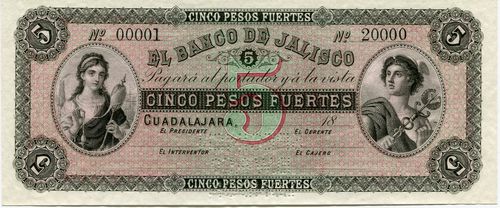
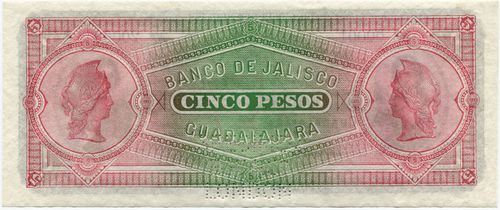 M378s $5 Banco de Jalisco specimen
M378s $5 Banco de Jalisco specimen
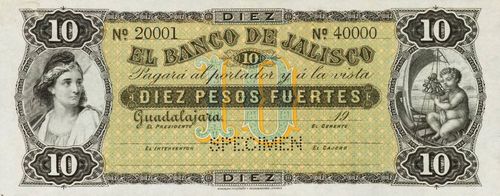
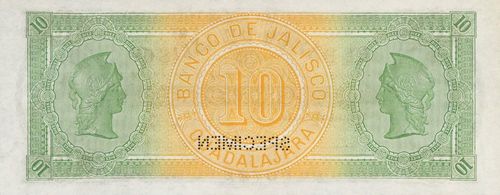 M379s $10 Banco de Jalisco specimen
M379s $10 Banco de Jalisco specimen
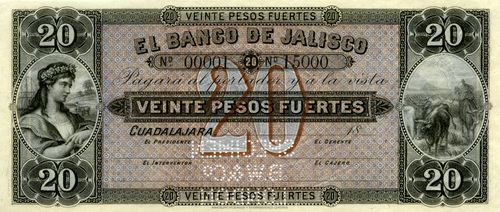 M380s $20 Banco de Jalisco specimen
M380s $20 Banco de Jalisco specimen
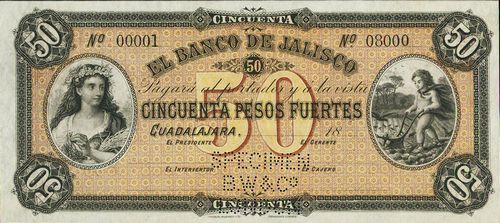
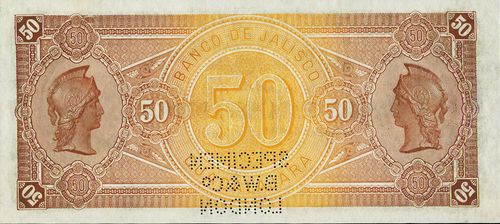 M381s $50 Banco de Jalisco specimen
M381s $50 Banco de Jalisco specimen
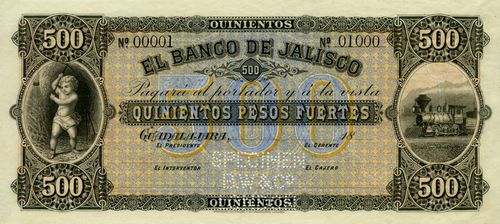 M383 $500 Banco de Jalisco specimen
M383 $500 Banco de Jalisco specimen
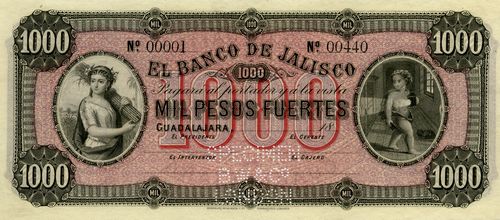 M384 $1,000 Banco de Jalisco specimen
M384 $1,000 Banco de Jalisco specimen
The vignettes on the $5 notes are of Eleuteria (or Liberty) on the left and Mercury on the right.
The signatories are Diego Moreno as Presidente, Narcisco Miranda as Gerente, Carlos Llaguno y del Hoyo and Salvador Velasco as Cajero and Manuel Gómez y Velasco as Interventor.
Presidente
Gerente
|
Narciso Miranda was cashier of the Chihuahua branch of the Banco Nacional de México by July 1886El Siglo Diez y Nueve, Novena Epoca, Año XLV, Tomo 90, Núm. 14,490, 7 July 1886. On 1 July 1888 he was appointed cashier at that bank's new branch in OaxacaEl Siglo Diez y Nueve, Novena Epoca, Año XLVII, Tomo 94, Núm. 15,114, 4 July 1888. He later became manager of the Oaxaca branch but resigned in October 1897El Imparcial, 29 October 1897; La Voz de México, 30 October 1897, presumably to become Director Gerente of the new Banco de Jalisco. He was elected as a deputy to the state legislature in November 1902La Voz de México, 12 November 1902 However, Miranda (and contador Ernesto Mora) were sacked on 4 April 1906 when an inspection revealed that they had defrauded the bank by creating false accounts and making loans to people who were notoriously insolvent. At an extraordinary annual general meeting on 9 October it was suggested that the amount involved was around $1,200,000La Gaceta de Guadalajara, Año IX, Núm. 41, 14 October 1906 and the total loss posted for 1905 was $816,920.17La Opinión, Veracruz, Tomo III, Núm. 701, 17 October 1906. |
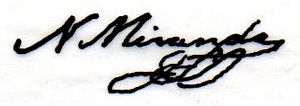 |
Cajero
|
Carlos Llaguno y del Hoyo was the first cashier. He moved to Tepic in April 1900 to establish a branch there and be its managerLa Democracia, Tepic, Año I, Núm. 7, 15 April 1900. The branch opened in JulyLa Democracia, Tepic, 22 July 1900. In September 1900 he was recalled to GuadalajaraLa Democracia, Tepic, 2 September 1900 and in November appointed Inspector of branches (Visitador de Sucursales y Jefe de la sección respectiva)El Correo Español, 7 November 1900. Then in March 1902 he was made manager of the new branch in Zamora, MichoacánLa Voz de México, Tomo XXXII, Núm. 64, 19 March 1902. In January 1905 Llaguno was elected president of the newly-formed Compañía Ferrocarril Jalisco y Michoacán via Chapala, S. A, which proposed to build a railway line from Guadalajara to Zamora and Patzcuaro with various branch lines in Jalisco and MichoacánThe Mexican Herald, 13 January 1905 and on 26 January 1907 he petitioned the federal government for a concession to establish a new industry, to extract and refine gum (cauchu) from the palo amarillo treeDiario Oficial, Tomo LXXXVIII, Núm. 33, 7 February 1907. He died in June 1920, at the age of 53El Informador, 20 June 1920. |
 |
|
Salvador Velazco will have taken over in April 1900 and signed notes from May 1900. Salvador Velasco resigned in 1906, because of a personal disagreement with the new manager, Gustavo RocheltLa Gaceta de Guadalajara, 30 September 1906. |
 |
Interventor
|
Manuel Félix Gómez y Velasco was born in Veracruz on 20 November 1846. He had been an employee of the Tesorería General de la FederaciónLa Patria, 1 December 1898 and was Interventor from the bank's inauguration in November 1898 until December 1906. He died in Mexico City in 1913. |
 |
Issues
$5 notes
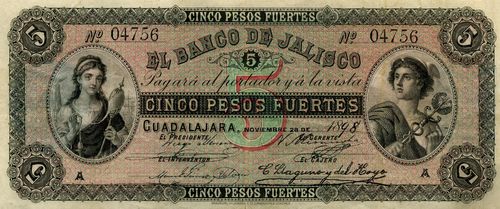 M378a $5 Banco de Jalisco
M378a $5 Banco de Jalisco
| Date of issue | Date on note | Series | from | to | Presidente | Interventor | Gerente | Cajero | |
| 28 November 1898 | A | 00001 | 20000 | Moreno | Gómez y Velasco | Miranda | Llaguno | includes number 04756 | |
| 5 September 1900 | 20001 | Velasco | includes numbers 20823 to 28452 overprinted TEPIC | ||||||
| includes numbers 33062, 36077 and 39870 overprinted TEPIC COLIMA |
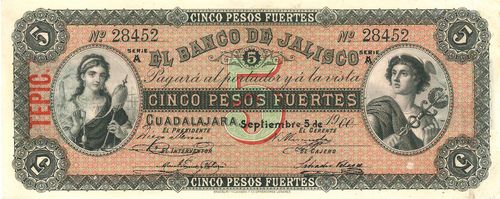
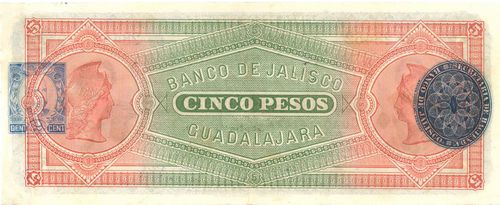
M378c $5 overprinted 'TEPIC'
$10 notes
| Date of issue | Date on note | Series | from | to | Presidente | Interventor | Gerente | Cajero | |
| 28 November 1898 | A | 00001 | 20000 | Moreno | Gómez y Velasco |
Miranda | Llaguno | includes number 13151 | |
| 5 September 1900 | 20001 | Velasco | includes numbers 20893 and 26268 overprinted TEPIC | ||||||
| includes numbers 30051, 30406 and 33388 overprinted TEPIC COLIMA |
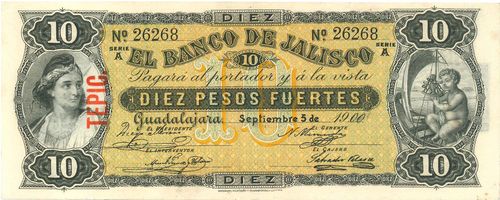
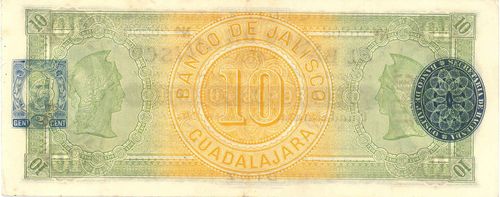
M379c $10 overprinted 'TEPIC'
$20 notes
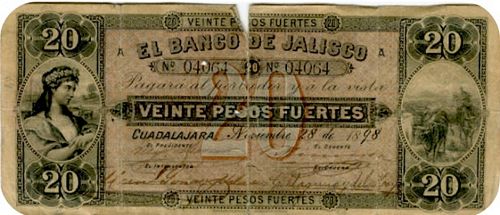
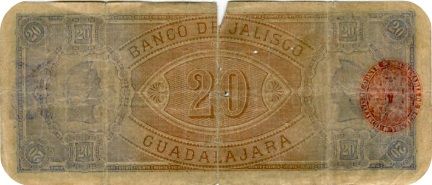 M380a $20 Banco de Jalisco
M380a $20 Banco de Jalisco
| Date of issue | Date on note | Series | from | to | Presidente | Interventor | Gerente | Cajero | |
| 28 November 1898 | A | 00001 | Moreno | Gómez | Miranda | Llaguno | includes number 04064CNBanxico #53562 | ||
| 20 May 1900 | 15000 | Llaguno | includes number 10497 number range taken from specimen |
$50 notes
| Date of issue | Date on note | Series | from | to | Presidente | Interventor | Gerente | Cajero | |
| 28 November 1898 | A | 00001 | Moreno | Gómez y Velasco | Miranda | Llaguno | includes number 06369 | ||
| 10 May 1900 | 08000 | Velasco | number range taken from specimen |
$100 notes
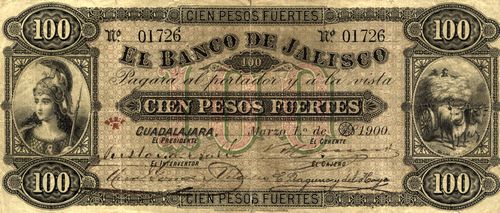 M382a $100 Banco de Jalisco
M382a $100 Banco de Jalisco
| Date of issue | Date on note | Series | from | to | Presidente | Interventor | Gerente | Cajero | comment |
| 28 November 1898 | A | 00001 | Moreno |
Gómez y Velasco | Miranda | Llaguno | includes number 00679CNBanxico #53797 | ||
| 1 March 1900 | Llaguno | includes number 01726 | |||||||
| 20 May 1900 | Velasco | includes number 02224CNBanxico #53787 |
$500 notes
| Date of issue | Date on note | Series | from | to | Presidente | Interventor | Gerente | Cajero | comment |
| A | 00001 | 01000 | number range taken from specimen |
$1,000 notes
| Date of issue | Date on note | Series | from | to | Presidente | Interventor | Gerente | Cajero | comment |
| A | 00001 | 00440 | number range taken from specimen |
The Interventor, Manuel Gómez y Velasco, signed $750,000 in notes in January and February 1900, $800,000 in March, and $1,000,000 in April to Juneinforme of interventor Gómez y Velasco, 28 July 1900, in Memorias de las Instituciones de Crédito correspondientes á los años 1900-1902, vol. I .
By 31 December 1900 $1,600,000 had been put into circulationinforme of interventor Gómez y Velasco, 31 January 1901, in Memorias de las Instituciones de Crédito correspondientes á los años 1900-1902, vol. I and a further $250,000 was issued in 1901informe of interventor Gómez y Velasco, 30 January 1902, in Memorias de las Instituciones de Crédito correspondientes á los años 1900-1902, vol. I .
In the beginning the notes had trouble being accepted. The two national banks, the Banco Nacional de México and the Banco de Londres y México, refused to accept them as did the railway. It was reported that someone who wanted to buy a ticket had to stay in Guadalajara as he only had Banco de Jalisco notesLa Voz de México, Tomo XXIX, Núm. 295, 28 December 1898: La Patria, 28 December 1898. In his first report the manager, Narciso Miranda, denied problemsLa Voz de México, Tomo XXX, Núm. 16, 20 January 1899 but he might have been putting on a gloss.

